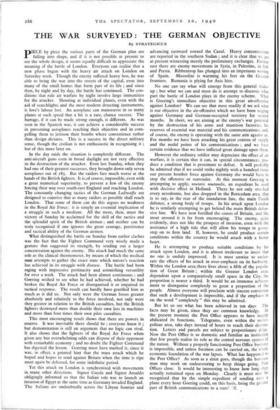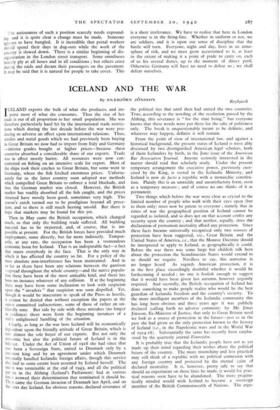THE WAR SURVEYED : THE GERMAN OBJECTIVE
By STRATEG ICUS
PIECE by piece the various parts of the German plan are falling into shape, and if it is not possible at present to see the whole design, it seems equally difficult to appreciate the meaning of the battle of London. Everyone can realise that a new phase began with the heavy air attack on London on Saturday week. Though the enemy suffered heavy loss, he was able to bring the war into the streets of the capital, even into many of the small homes that form part of its life ; and since then, by night and by day, the battle has continued. The con- ditions that rule air warfare by night involve large immunities for the attacker. Shooting at individual planes, even with the aid of searchlighti and the most modern detecting instruments, is love's labour lost. An aeroplane can manoeuvre in so many planes at such speed that a hit is a rare, chance success. The barrage, if it can be made strong enough, is different. As was seen in the Spanish war, it can achieve a considerable success in preventing aeroplanes reaching their objective and in com- pelling them to jettison their bombs where convenience rather than design dictates. This is a success in the direct military sense, though the civilian is not enthusiastic in recognising it ; but of this more later on.
In the day raids the situation is completely different. The anti-aircraft guns even in broad daylight are not very effective in the destruction of the attacker. Even last Sunday, when they had one of their greatest successes, they brought down only seven aeroplanes out of 185. But the raiders fare much worse at the hands of the British fighters. It is,of course, impossible, even with a great numerical superiority, to prevent a few of the enemy forcing their way over south-east England and reaching London. The constantly changing tactics of the German Luftwaffe are designed to contrive that as many raiders as possible shall reach London. That some of them can do this argues no weakness in the Royal Air Force: it is simply an essential implication of a struggle in such a medium. All the more, then, must the victory of Sunday be acclaimed for the skill of the tactics and the splendid spirit of the British airman ; and neither can be truly recognised if one ignores the great courage, persistence and tactical ability of the German airmen.
What distinguished the battle on Sunday from earlier clashes was the fact that the Fighter Command very wisely made a gesture that suggested its strength, by sending out a larger concentration against the enemy. His attack had much the same role as the clinical thermometer, by means of which the medical man attempts to gather the exact state which nature's reaction has achieved in its struggle with disease. The battle had been raging with impressive pertinacity and astonishing versatility for over a week. The attack had been almost continuous ; and Goering wished to see what he had achieved, whether he had broken the Royal Air Force or disorganised it or impaired its tactical response. The result can hardly have gratified him as much as it did us. Not only were the German losses greater absolutely and relatively to the force involved, not only were they greater in relation to the British casualties, but the British fighters destroyed more than double their own loss in machines and more than four times their own pilot casualties.
This most encouraging result shows that there are powers in reserve. It was inevitable there should be ; everyone knew it ; but demonstration is still an argument that no logic can rivaL It also shows that the fighters of the Royal Air Force when given any but overwhelming odds can dispose of their opponent with remarkable economy ; and no doubt the Fighter Command has digested the lesson. Goering must have marked it, since it was, in effect, a pointed hint that the mass attack which he hoped and hopes to send against Britain when the time is ripe must again be deferred, for some indefinite period.
Yet this attack on London is synchronised with movements in many other directions. Signor Gayda and Signor Ansaldo obligingly informed us that the Italian role was to launch an invasion of Egypt at the same time as Germany invaded England. The Italians are undoubtedly across the Libyan frontier and advancing eastward toward the Canal. Heavy concentrations are reported in the southern Sudan ; and it is clear that we are at present witnessing merely the preliminary exchanges. Farther east there are enemy movements in Syria, in Palestine, in Irak and Persia. Ribbentrop has plunged into an impetuous wooing of Spain. Mussolini is warming his feet on the Grecian frontiers. Rumania is plying for Axis hire.
No one can say what will emerge from this general shake- up ; but what we can and must do is attempt to discover what part the battle of London plays in the enemy scheme. What is Goering's immediate objective in this great air-offensive against London? We can see that most readily if we ask what is our objective in the air-offensive which we have been waging against Germany and German-occupied territory for several months. In short, we are aiming at the enemy's war potential by the destruction of his arms and munition factories, his reserves of essential war material and his communications; and, of course, the enemy is operating with the same aim against us. For months we have been attacking his great centres of supply and the nodal points of his communications ; and we have certain evidence that we have inflicted great damage upon them.
However the ordinary soldier may depreciate the effect of air warfare, it is certain that it can, in special circumstances, pro- duce a condition that is proximate to defeat. It will probably be admitted that if we could strike nightly with a hundred times our present bomber force against Germany she would have to stop the offensive or surrender. At this moment Goering is attempting to apply, mutatis mutandis, an expedient he used with decisive effect in Holland. There he not only attacked every aerodrome, but also dropped in the Rotterdam area, that is to say, in the rear of the inundation line, the main Dutch defence, a strong body of troops. In his attack upon London he is similarly attempting to get behind the main British defen- sive line. We have now fortified the coasts of Britain, and the moat around it is far from encouraging. The enemy, quite evidently, does not like the prospect of invasion, even with the assistance of a high tide that will allow his troops to goose- step on to firm land. If, however, he could produce certain conditions within the country he would attack with a better heart.
He is attempting to produce suitable conditions by his attack upon London, and it is almost irrelevant to insist that no one is unduly impressed. It is most unwise to under- rate the effects of his attack in over-emphasis on its barbarity. Within the London area,there lives about a fifth of the popula- tion of Great Britain ; within the Greater London area, dependent upon a comparatively small space in the City, the proportion is nearer a third. It would be an immense achieve- ment to disorganise completely so great a proportion of the people. Almost everyone will proclaim with sincere conviction that such a development is impossible, and if the emphasis is on the word " completely " this may be admitted.
But let us see what has been achieved in ten days The facts may be given, since they are common knowledge. At the present moment the Post Office appears to have largely abdicated its functions. Telegrams, even within the metr3- politan area, take days instead of hours to reach their destina- tion. Letters and parcels are subject to proportionate delay. Now the Post Office is so domestic and familiar an institution that few people realise its role as the central nervous system of the nation. Without a properly functioning Post Office business is impossible, and unless business can be carried on, the whole economic foundation of the war lapses. What has happened to the Post Office? As soon as a siren goes, though the business man may work on endeavouring to keep things going, Post Offices close. It would be interesting to know how long they actually remained open on Monday. Clearly it must nosy bebe . recognised that by the simple expedient of sending over a plane every hour Goering could, on this basis, bring the greater part of British communications to a stanc! -ill. 1 he seriousness of such a position scarcely needs expound- ing. and it is quite clear a change must be made. Someone appears to have bungled. It is incredible that postal workers should spend their days in dug-outs while the work of the country is slowed down. There is a similar beginning of dis- organisation in the London street transport. Some omnibuses bravely ply at all hours and in all conditions ; but others cease during the raids and decant their passengers on the pavement. It may be said that it is natural for people to take cover. This is a sheer irrelevance. We have to realise that here in London everyone is in the firing-line. Whether in uniform or not, we are soldiers, and it is upon our sense of discipline that the battle will turn. Everyone, night and day, lives in an atmo- sphere of risk, and we must grow accustomed to it, at least to the extent of making it a point of pride to carry on, each of us his several duties, up to the moment of direct peril. Otherwise Germany will have no need to defeat us ; we shall defeat ourselves.



























 Previous page
Previous page